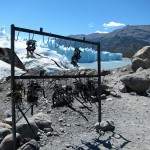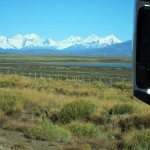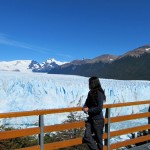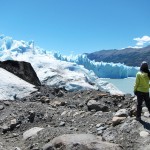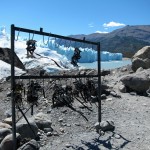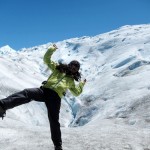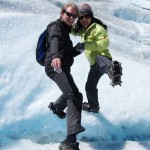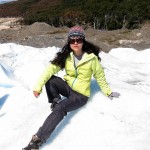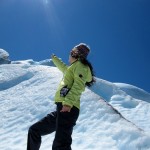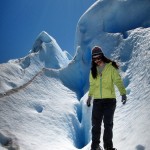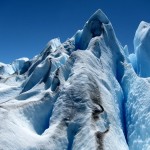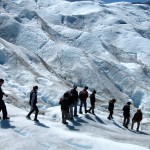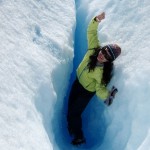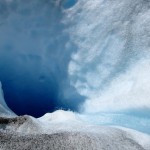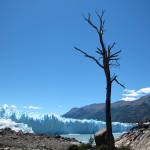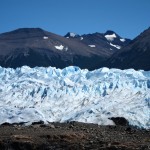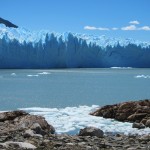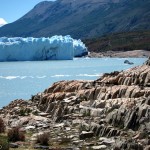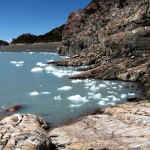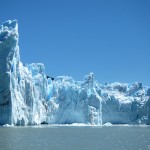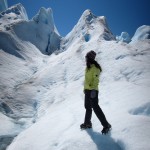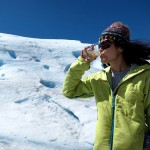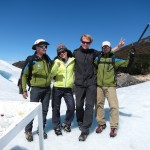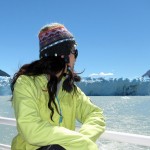The sight of 3 miles wide, with an average height of 240 feet blue tinted glacier is something that I’ll never forget. Perito Moreno Glacier is located in the Los Glaciares National Park, south west of Argentina.
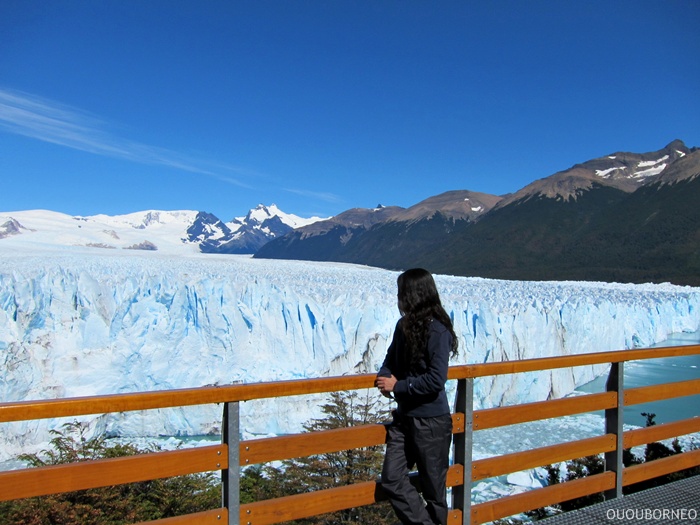
Perito Moreno glacier front wall (Los Glacier National Park)
I booked a mini-trekking tour with Hielo Aventura and enjoyed it thoroughly. I highly recommend this tour.
You can book the tour in El Calafate either with local tourist agencies or with Hielo Aventura directly. I would suggest booking two days in advance because the tour might sell out. Check weather forecast first before you book the tour.
The tour includes ride to Los Glacier Park to enjoy the breathtaking view of Perito Moreno glacier front wall, then a boat ride to see glacier’s south face. Lastly, you’ll be taken to do a two-hour trekking on ice.
The Perito Moreno Glacier is one of only three Patagonian glaciers that is growing. With this constant shifting of ice, the glacier guides have to scout out a new route every morning for the day’s tours.
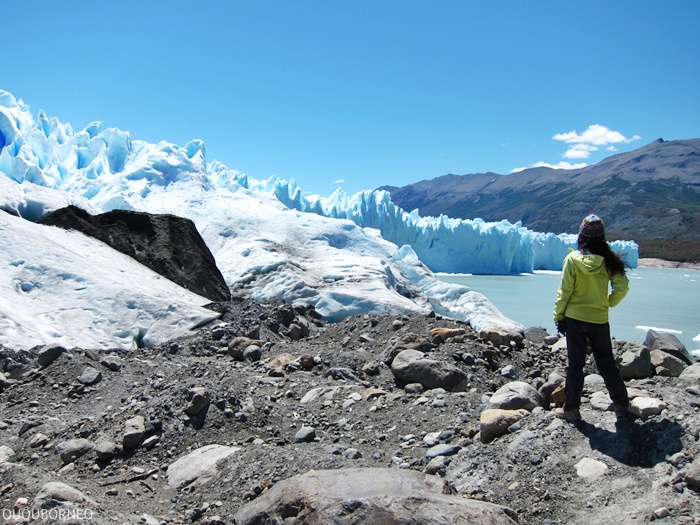
Before mini-trekking
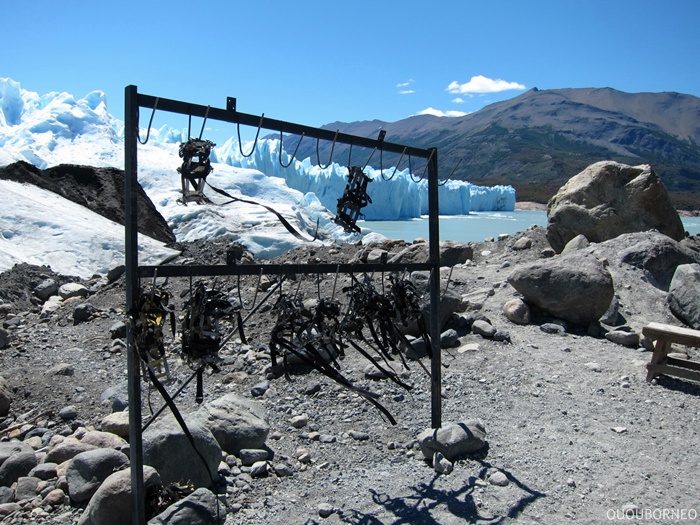
Crampons in the wind
The trek was fun and not very physical demanding. It could be more challenging if the weather is windy and cold. But I was blessed with clear blue sky and very little wind.
I wore a medium-weight long sleeve tee, windbreaker jacket & waterproof pants, silk thermal pants, sunglasses (absolute must), hiking boots, hat and gloves (they provide gloves) and I felt warm at one point. Remember though, it was an unusual sunny day in January.
The main purpose of wearing gloves is not for keeping hands warm but to protect them from getting cut by sharp ice.
The water from the stream on the glacier is drinkable. I tried and the water tasted clean and super fresh. You can fill up a bottle and take with you.
We finished the tour with a bang – drinking Irish Whiskey mixed with glacier ice! 🙂 Now, that’s a drink that you don’t get in any bars.
With cravasses and streams on the glacier, we were told not to take pictures while walking. But I couldn’t help “risking” my life… 😛
Removing my right glove, turning on camera, taking 3 seconds footage, then storing the camera away in my pocket, and putting the glove back on, … repeat …
Here’s the video I made. Enjoy.
Note: If you sign up for mini-trekking, DO NOT sign up for a separate boat ride to see two or three glaciers. You’ll see enough glacier during mini-trekking.
The boat trip was seven hours of boring moments. Yes, I took tons of pictures, chatted with people, meditated, napped on open deck, had sandwiches, read the (only) book I brought with me, … still had six more hours to kill. VIP area (+125 more pesos) was just another smaller confined area with unlimited drinks. No, thank you!
If you are going with a group of friends or family, it might be more fun, but I was alone.
There’s only one company in town that offers the boat rides. Think twice before you sign up if you are traveling solo!
Some photos:
- Crampons in the wind
- On the way to Los Glacier National Park
- Perito Moreno glacier front wall (Los Glacier National Park)
- Before mini-trekking
- Crampons hanging
- Me and Chris (my photographer of the day from Germany)
- Stuck?
- With guides Morries and Juan
- Bye bye Perito Moreno …
More about glaciers:
1. Why are there glaciers?
Glaciers form where more snow falls than melts over a period of years, compacts into ice, and becomes thick enough to begin to move. That is, a snow patch becomes a glacier when the deepest layers begin to deform due to the weight of the overlying snow and ice.
2. Why are glaciers blue?
Because the red (long wavelengths) part of white light is absorbed by ice and the blue (short wavelengths) light is transmitted and scattered. The longer the path light travels in ice, the more blue it appears.
2.1 So… why is snow white?
Light does not penetrate into snow very far before being scattered back to the viewer. However, the next time you are in an igloo, notice that it is blue inside. You can also poke a stick into some snow, shade the area around the hole, and look deep into the snowpack. The light that has traveled some distance through the snow will be enhanced in blue.
3. Is glacier ice colder than regular ice?
No – indeed, all of the physical, thermal and electrical properties of “regular icebox ice” and glacier ice are identical: density, viscosity, heat of fusion, latent heat, heat capacity, dielectric constant, thermal conductivity, absorption, emissivity, etc. The few small differences in characteristics are solely due to grain size differences (see 3.1). NOTE: High pressure forms of ice with different properties have been produced in laboratory experiments, but none occur naturally on earth, not even at the base of the Antarctic or Greenland ice sheets.
3.1. But doesn’t glacier ice last longer in drinks!!!???
Yes – a little, but only because the ice crystals are larger. Crystals melt from the outside and large crystals expose less surface area per unit volume of ice; therefore, ice with larger crystals melts more slowly.
(Source:http://ak.water.usgs.gov/glaciology/FAQ.htm)

